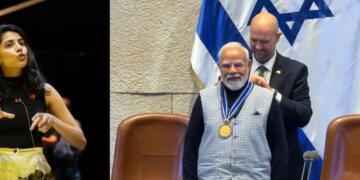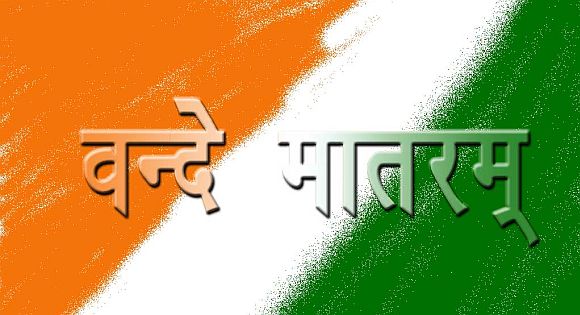Hindus call India, their motherland. Muslims call it their homeland. Lord Ram said “जननी जन्मभूमिश्च स्वर्गादपि गरीयसी (Mother and motherland are superior to Heaven). Prophet Mohammad said, “Love of one’s homeland is a part of faith.” So we see both major religions of India advocate love and respect for the nation. However, there are a lot of subjects on which these two views do not converge, they in fact end up turning incongruous. Tomorrow is 69th Independence Day of India, so let me bring up the topic whose echoes keep reverberating in assembly halls, parliament, on TV and sometimes in our lives.
Vande Mataram – I bow to thee mother.
The Background: The term “Vande Mataram” was originally written as a part of Chattopadhay’s novel ‘Anandamath’ in the year 1882. Anandamath is loosely based on the devastating Bengal famine of 1770 and the unsuccessful Sannyasi Rebellion. The novel tells the story of Satyanand, a sanyasi who fights against the tyranny of Muslim Sultanate in the late 18th century. Satyananand is helped by “a divine goddess” in his quest.
The Philosophy: The book and the song use religious imagery to pep up patriotism. The personification of the nation has been deliberately done in the book and the song to make the idea of nationalism more relatable and appealing. It simply asks the reader to imagine the nation as their mother and revere it like one would revere one’s own mother. Henry Louis Vivian Derozio in his “To my native land” uses the same imagery when he says “My country! In thy days of glory past. A beauteous halo circled round thy brow, and worshipped as a deity thou wast”. It’s a fact that poets and writers have used the art of personification time and again to make their message clearer and more likeable.
The Usage: The term Vande Mataram became synonymous to India’s struggle for its independence. The term bothered the British so much so that they had it banned fearing massive civil disobedience and agitations. They took “Vande Mataram” as one of the most powerful unifying concepts of Indians.
The Criticism: Since the core plot of the book revolves around the Muslims and the tyranny of their sultanate in Bengal, the book has been perceived to be a book that pushes the “Hindutva” agenda and whose very philosophy is anti-Muslim. It is akin to saying “You criticize Aurangzeb, you are anti Muslim”. The Muslim Sultanate in Bengal was tyrannical and despotic and the contextualized criticism of it does not automatically make it an ‘anti-Muslim’ book. And since the song is derived from the book, it becomes anti Muslim too.
The Treatment: Back in the 1930s, The Muslims of India raised objections regarding the lyrics of the song which they considered to be religious and as something that promoted idolatry. And till date, Vande Mataram remains a sticking issue in the secular-communal debate in Independent India. Numerous fatwas have been issued against it. Ironically, the single most unifying factor of India’s struggle for its independence has been used as a polarizing concept by Hindu and Muslim leaders alike. Muslim bodies, clerics and clergymen have issued numerous fatwas against it. An interesting Fatwa by a cleric decreed “All Muslim singers of the Vande Mataram, by singing it indulge in polytheism and as a consequence of that cease to be Muslims. Their marriages, hence stand annulled.” Hindus on the other hand have reacted sharply to these fatwas by questioning the patriotism of Muslims. Recently BSP MP Shafiqur Rehman Burq created quite a stir when he walked out of the House when Vande Mataram was being sung.
The Conclusion: What I am going to conclude is subjective and many people may have their own conclusions depending upon their own understanding of the history of the term Vande Mataram. Of course their own prejudices are going to play a major part in their interpretations. But there is one conclusion that I believe is and should be global – Bankim Chandra Chattopadhyay was not anti-Muslim”. After all he created the fabulous Ayesha in Durgeshnandini and many powerful and positive Muslim characters in Rajsinha. Now let me go ahead with my conclusion. Vande Mataram is not anti-Muslim, it is just pro-India. The careful and intelligent use of religious imagery is to invigorate patriotism. While the literal meaning of it may be “Bowing to mother (land)” which is not permitted in Islam, its symbolic interpretation is just reverence and respect to mother (land). Of course one doesn’t need to chant Vande Mataram to prove his/her nationalist credentials. It shouldn’t be decreed upon anybody. But since the song has the terminology “National” prepended with it, walking out while it is being played is simply the disrespect of the nation.





























Beautifully written. Walking out while national song is being played is clearly a disrespect to the nation, and shall not be tolerated.